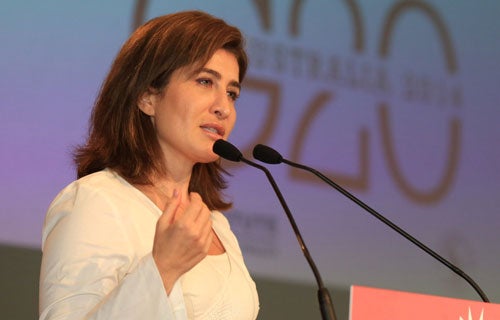
Harnessing the entrepreneurial drive of Arab youth
Arab youth are more entrepreneurial than past generations and can usher in new era of prosperity, says Waterloo researcher

Arab youth are more entrepreneurial than past generations and can usher in new era of prosperity, says Waterloo researcher
By Cherri Greeno Marketing and Strategic CommunicationsWhen Bessma Momani teaches her students about past and current conflict in the Middle East, she tries to focus on one important point – the human side of struggle.

“When we lose sight of the people affected by conflict, we dehumanize their experience,” says the associate professor in the Department of Political Science at the University of Waterloo. “Sadly, the Middle East is often described in ways that are void of real people with real feelings. I hope my students leave with a better appreciation of the kind people in the region who are too often stuck under autocratic governments.”
Along with being a popular Waterloo professor, Momani teaches at the Balsillie School of International Affairs and is a Senior Fellow at the Centre For International Governance and Innovation (CIGI).
Most recently, Momani completed a book about Arab youth in the Middle East, which focuses on negative assumptions about the region and its youth. “I demonstrate how they are more cosmopolitan, educated, entrepreneurial, creative and tolerant than their parents’ generation. They can bring great prosperity for the region, if combined with targeted policies to harness the capabilities of Arab youth.”
Momani is also a renowned author and regular media analyst and contributor to both national and international media on the Middle East and global economic governance issues. She has authored and co-edited several books and articles and writes a blog at CIGI called Wealth and International politics and a column for the Huffington Post.
Much of Momani's research has focused on the Arab Spring, which she says “was a cry of Arab youth to say 'we deserve better' than the autocratic, corrupt and dysfunctional politics of our countries.’ ”
Despite years of protests and demonstrations, Momani says it’s unlikely the fight is over. “With so much death and destruction, especially in Syria, it is hard to be joyous about the Arab Spring,” she says. “That said, I don't think it is finished and the desire for change is just as strong as ever, but perhaps there is a rethinking of the means to achieve change.”
Momani has provided private and public sector clients with advice on investment opportunities in the Middle East and has worked as a consultant to the International Monetary Fund to help devise a new set of guidelines for its staff members.
She has also provided business presentations to law firms, oil and gas companies and global manufacturers on how best to expand their markets in the Middle East, North Africa and the Arab Gulf countries.
As for Canadians, and in particular, her students, Momani says it is important to focus on humanity. “It is important for Canadians to always remember these are people, not numbers or ideologies or governments,” she says. “Behind these struggles are individuals with normal lives who find themselves as activist, blogger, protestor, rebel and refugee.”

Read more
Discover how Waterloo alumni are driving Canada’s economy with five tech companies making a local and global impact

Read more
Meet the five exceptional graduate students taking the convocation stage as Class of 2024 valedictorians

Read more
The Government of Canada announces funding for discovery and applied research in engineering, natural sciences, health and social sciences
The University of Waterloo acknowledges that much of our work takes place on the traditional territory of the Neutral, Anishinaabeg, and Haudenosaunee peoples. Our main campus is situated on the Haldimand Tract, the land granted to the Six Nations that includes six miles on each side of the Grand River. Our active work toward reconciliation takes place across our campuses through research, learning, teaching, and community building, and is co-ordinated within the Office of Indigenous Relations.